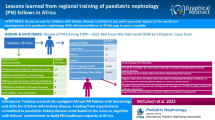Abstract
Appropriate training in paediatric nephrology is a comprehensive approach designed to develop skills and capabilities to deal with the following basic components of medical care: (1) medical competence for clinical and research activities; (2) interpersonal relationships directed at maintaining patients' freedom and autonomy; and (3) adequate incorporation of technological, financial and managerial aspects of paediatric nephrology services. Inappropriate training causes frequent, dramatic and paradoxical negative feedback in developing countries: shortage of functioning medical equipment, skilled manpower and trained paediatric nephrologists co-exist with unused high-cost medical equipment and loss of skilled health care professionals. Appropriate training, tailored to the needs and resources of developing countries, could be an efficient way to develop high-quality paediatric nephrology care. Efficient training must develop self-reliant, self-sufficient and skilled health care professionals in the local economic, educational, technological and political context. Regional and international co-operation is essential to promote adequate training in paediatric nephrology. Developing countries lack an effective and accurate information communication network for selecting modern technology for paediatric nephrology. The development of this network, through international co-operation, is an urgent requirement.
Similar content being viewed by others
References
Cameron S (1987) Historical, social and geographical factors: pediatric nephrology in an unjust world. In: Holliday MA, Barrat TM, Vernier RL (eds) Pediatric nephrology, 2nd edn. William and Wilkins, Baltimore, pp 341–347
Srivastava RN (1987) India. Nephrology around the world. In: Holliday MA, Barrat TM, Vernier RL (eds) Pediatric nephrology, 2nd edn. William and Wilkins, Baltimore, pp 354–358
Abdurrahman MB, Elidrissy TH (1988) Childhood renal disorders in Saudi Arabia. Pediatr Nephrol 2:368–372
Chesney RW, Arant BS, Hirschman G, Jose PA, Novello CA, Siegel NJ (1989) Position paper on current status and future needs of pediatric nephrology in the United States: training and research. Pediatr Nephrol 3:372–380
Woolhandler S, Himmelstein DU, Slobodan L (1987) Transplanted technology. Third World options and First World science. N Engl J Med 317:504–506
Coe GA (1988) Health technology and schools of public health. Educ Med Salud 22:504–515
Peña Mohr J (1986) Report from the Americas. In: Shore ML, Solari A (eds) Proceedings of the First International Conference of Medical Device Regulatory Authorities (ICMDRA) 2–6 June, 1986 World Health Organization, Pan American Health Organization, Food and Drug Administration, Center for Devices and Radiological Health, Rockville, Maryland, pp 28–31
Msaki P (1986) Report from Africa. In: Shore ML, Solari A (eds) Proceedings of the First International Conference of Medical Device Regulatory authorities (ICMDRA), 2–6 June, 1986. World Health Organization, Pan American Health Organization, Food and Drug Administration, pp 18–19
Guerra de Macedo C (1986) The challenge of medical device technological development. In: Shore ML, Solari A (eds) Proceedings of the First International Conference of Medical Device Regulatory Authorities (ICMDRA), 2–6 June 1986. World Health Organization, Pan American Health Organization, Food and Drug Administration, pp 4–6
Dahlman C, Westpahl L (1982) Technological effort in industrial development: an interpretative survey of recent research. In: Stewart F, James J (eds) The economics of new technology for developing countries. Westview Press, Colorado, pp 105–137
Grunberg J, Sitkewich A, Esquivel N, Silva D (1978) Transporte y acceso a la consulta externa especializada. Courrier 28:563–569
Brewer EJ, McPherson M, Magrab PR, Hutchins VL (1989) Familycentered, community-based, coordinate care for children with special needs. Pediatrics 83:1055–1059
Oreopoulus DG (1988) Human care and technology. Perit Dial Int 18:113–117
King NMP, cross AW (1989) Children as decision makers: guidelines for pediatricians. J Pediatr 115:10–16
Grunberg J, Esquivel N, Velasco MI, Farias Y, Peña S (1989), Atención de niños con nefrosis en medios con reducida dotaciòn nefrológica. Pediatria al Dia 5:96–101
Grunberg J, Verocay MC, Perez D (1989) Continuous ambulatory peritoneal dialysis in a developing country. In: Proceedings of the VIII Congress of the Intermational Pediatric Nephrology Association, Toronto. Pediatr Nephrol 3: S13
Grunberg J, Verocay MC, Lorenzo ME (1987) Unusual problems with CAPD: the impact of logistics in developing countries. A case report. Perit Dial Bull 5:142–143
Grunberg J, Verocay MC, Area A (1987) Pediatric CAPD in developing countries. In: Fine RN (ed) Chronic ambulatory peritoneal dialysis (CAPD) and chronic cycling peritoneal dialysis (CCPD) in children, Martinus Nijhoff, Boston, pp 21–31
Author information
Authors and Affiliations
Rights and permissions
About this article
Cite this article
Grunberg, J. Appropriate training in paediatric nephrology for developing countries: hypothesis and proposals. Pediatr Nephrol 4, 290–295 (1990). https://doi.org/10.1007/BF00857679
Issue Date:
DOI: https://doi.org/10.1007/BF00857679




